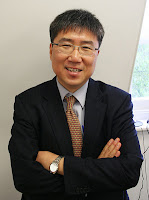 Talk by Ha-Joon Chang , Reader in the Political Economy of Development at the University of Cambridge.
Talk by Ha-Joon Chang , Reader in the Political Economy of Development at the University of Cambridge.Redactor: Inna GRINIS
Ha-Joon Chang decided to base his today’s talk on one of his articles published in 2002* that laid the foundations for a new heterodox approach to economics: the Institutionalist Political Economy (IPE). Instead of simply criticising the free market doctrine for its anti-interventionist rhetoric, Chang reveals the four real weaknesses of “neo-liberalism” or as he calls it: the “unholy alliance” of neoclassical economics and the Austrian-libertarian tradition.
· What is a “free market”?
· What is a “free market”?
The definition of a free market has evolved over time and there is probably no such thing as a “free market”. Whether a state intervention is considered as undermining the free market or not, will actually depend on the legitimacy and hierarchy of the “rights-obligations” present in a society. Consider for example child labour: today even the most neoliberal person won’t be happy to bring it back, however during the Industrial Revolution, regulating child labour was effectively disrupting a free contract between children who wanted to work, and employers who were keen on employing these children at the ongoing wages.
Therefore we might well see a market as “free” simply because we cannot distinguish between the regulation behind it and the values we have embodied over time.
· “If the market fails, the economy fails”
We can only speak about “market failure” in contrast to some benchmark: the “ideal market”. But who sets the latter? Consider the example of a monopoly: by neoclassical standards this is a “market failure” since the benchmark is the “perfect competition”. On the other hand, according to J. Schumpeter this is a “market success”: monopolies drive capitalism through innovations and their presence makes the economy alive and efficient.
· The “market primacy assumption”
Already K. Polanyi in The Great Transformation (1944) suggested that it is the state that institutes the market. Examples include the markets for electricity, telephoning, the defence of property rights... The experience of developing and ex-communist countries suggests than once you have destroyed the state, the market does not come in naturally, you need to create it.
· Market, state and politics
Chang criticises the neoclassical solution of deregulating and depoliticising the market in order to eliminate the problems related to corruption and the interference of selfish bureaucrats with the free market. First of all “self-interest” is not the only motivation of human behaviour, but more importantly the “market is itself political”. The state determines the participants in different markets as well as their rights. Was the interest rate set at 0.25% because of the Supply and Demand interactions in the loanable funds market, or is it a political decision?
Here comes the paradox: the “free market” that neoliberals want to save from the corrupted politics has been created inside an institutional structure and therefore is itself based on a set of political beliefs.
Capitalism is in fact much more than just “the market”: it is a complex set of formal and informal institutions such as the state, firms, markets, social norms...
Capitalism is in fact much more than just “the market”: it is a complex set of formal and informal institutions such as the state, firms, markets, social norms...
The IPE tries to overcome the above weaknesses by introducing the role of institutions. The latter motivate individuals’ behaviour, but individuals themselves can affect and change institutions. We cannot draw a clear boundary between the market, the state and institutions. A framework analysing their interrelation must be created.
*’Breaking the Mould – An Institutionalist Political Economy Alternative to the Neo-Liberal Theory of the Market and the State’, Cambridge Journal of Economics, 2002, vol. 26, no. 5
If you want to read the full article: http://www.unrisd.org/unrisd/website/document.nsf/0/44552a491d461d0180256b5e003cafcc/$file/chang.pdf
This is Ha-Joon Chang’s personal website: http://www.hajoonchang.net/
A great resource if you are interested in this topic.